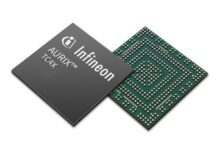
The automotive sector has consistently been advancing and adopting new technologies. The latest addition to this list is the integration of 5G chipsets into vehicles, which promises to revolutionize the way people drive and interact with cars. 5G chipsets will bring high-speed connectivity and low latency to vehicles, enabling a host of new features and capabilities that were previously impossible. Find out a few of the features below:
Enhanced Connectivity
One of the most significant ways 5G chipsets will change the automotive industry is by enhancing connectivity. With 5G technology, vehicles can be connected to the internet at unprecedented speeds, allowing seamless communication between cars, infrastructure such as traffic lights and road signs, and other devices. This will give rise to a new era of smart cars that can communicate with each other and their environment in real-time, improving safety, traffic flow, and efficiency.
In February 2023, Qualcomm announced the latest addition to its growing connected car technology portfolio with its Snapdragon Auto 5G Modem-RF Gen 2. This is Qualcomm’s most advanced automotive modem-RF that comes with a network capacity of 200 MHz, which allows it to provide reliable and low-latency connectivity. This is crucial for ensuring safe, intelligent, and immersive riding experiences.
5G Chipsets Improved Autonomous Capabilities
5G technology will also significantly enhance the autonomous capabilities of vehicles. With ultra-low latency, vehicles can receive and process information faster, enabling them to make decisions more quickly and efficiently. This will lead to more advanced autonomous systems that can react to changing road conditions, traffic patterns, and unexpected obstacles more accurately and precisely than before. This will further help the automotive industry to develop advanced safety features that can prevent such accidents.
In January 2023, Quectel Wireless Solutions, a leading global supplier of wireless communication modules and solutions, launched new 5G NR modules for the automotive sector. The new modules are launched under the brand name AG59x series and they are able to deliver a wide range of enhancements including direct communications, improved location services, a high-performance multicore application processor, multi-gigabit cellular connectivity, and strengthened security. All of these features make it an ideal solution for autonomous driving.
Enhanced User Experience
5G technology will also significantly enhance the user experience in vehicles. With the improved connectivity and bandwidth provided by 5G chipsets, passengers will be able to enjoy high-speed internet connectivity for streaming media and using real-time navigation services. This will enable new in-car entertainment options, such as video streaming and online gaming. Moreover, it will provide advanced navigation systems that can provide real-time traffic updates, alternate route suggestions, and personalized recommendations.
In April 2022, BYD, one of the largest manufacturers of electric vehicles (EVs), launched its flagship EV series called Han EV. It is equipped with a 5G chipset to bring fast data connectivity so that users can stay connected, stream high-definition videos, or play games online.
Improved Vehicle Maintenance
5G technology will also improve vehicle maintenance by enabling real-time remote monitoring and diagnostics of vehicles. With sensors and other components streaming data in real time, vehicle manufacturers can detect potential issues before they become major problems. This allows for proactive maintenance, reducing the likelihood of unexpected breakdowns and minimizing the risk of accidents. By predicting maintenance needs accurately, manufacturers can plan maintenance schedules effectively, minimize downtime, and reduce the cost of repairs. Remote monitoring and diagnostics provide a significant improvement in vehicle maintenance, benefiting both vehicle manufacturers and owners.
The obstacles and industry efforts to address them:
The integration of 5G technology in vehicles presents some challenges, but the industry is actively working to address them. One of the biggest challenges is the rollout of 5G infrastructure. The adoption of 5G-enabled vehicles requires a reliable and extensive 5G network, which is not yet available in all areas. Governments and private organizations are investing in the 5G infrastructure to ensure that it is available in more areas. Manufacturers are exploring hybrid communication systems to ensure seamless connectivity.
Another challenge is the increased security risk. As 5G-enabled vehicles become more connected and share more data, there is a higher risk of cyberattacks. Hackers may attempt to gain access to vehicle systems, compromising driver safety. To address this challenge, manufacturers are implementing advanced security measures, such as encryption and multi-factor authentication, to ensure that vehicle systems are secure. They are also developing over-the-air software updates that can quickly address any security vulnerabilities.
Cost is another challenge that manufacturers face while integrating 5G technology in vehicles. The integration of this advanced technology requires significant investment, which may increase the cost of vehicles. However, as technology becomes more mainstream, manufacturers can take advantage of economies of scale to reduce costs. They are also exploring new business models, such as subscription-based services, to make 5G-enabled vehicles more accessible to consumers. Overall, the industry is actively addressing the challenges associated with 5G-enabled vehicles to ensure that they provide a seamless and safe driving experience for consumers.
Conclusion:
With the integration of 5G chipsets, vehicles are expected to become more safer, intelligent, and efficient, thereby paving the way for a new era of transportation. Despite the challenges associated with the adoption of 5G-enabled vehicles, the industry is actively working to overcome them.
Looking ahead to the future of the automotive industry, it is evident that 5G technology will play a crucial role in influencing the way people drive and interact with vehicles. With real-time data streaming, remote diagnostics and monitoring, and improved connectivity, 5G technology will not only improve the driving experience but also pave the way for autonomous driving in the future.


















